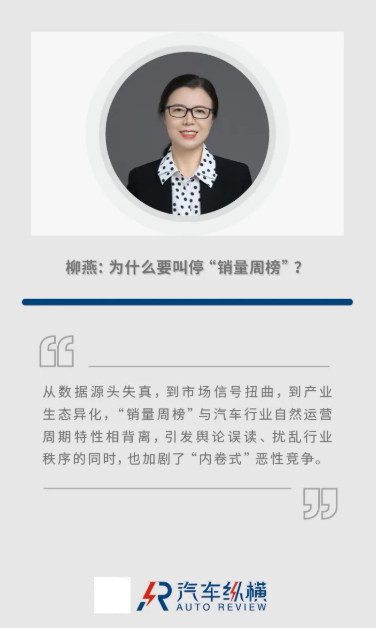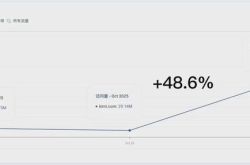Why the 'Weekly Sales Ranking' is Being Discontinued
![]() 03/24 2025
03/24 2025
![]() 655
655

Over the past two years, the domestic automobile market has witnessed a surge in unofficial weekly sales rankings. As these rankings gained traction, they increasingly sparked controversies, misled public opinion, disrupted industry order, and exacerbated internal competition. Mainstream automakers have increasingly voiced their opposition to this practice.
In response, following comprehensive research and industry discussions, the China Association of Automobile Manufacturers (CAAM) officially issued the 'Proposal on Regulating the Release of Enterprise Data' on March 18th. The goal is to standardize data release, uphold industry credibility, promote healthy competition, and eliminate inappropriate promotional activities. While urging enterprises to cease publishing weekly sales rankings, the proposal also calls on third-party institutions and media to follow suit.
This move has garnered widespread support from automotive enterprises and automotive media. It marks one of the highest-rated initiatives for industry self-regulation launched by CAAM in recent years, reflecting a consensus among industry stakeholders.
Following the proposal's release, some negative speculations emerged. Some netizens suspected that a particular brand might have manipulated the data to sway the association's decision, while others questioned whether the weekly rankings threatened the interests of CAAM, which primarily releases monthly data. For these unfounded speculations, we assure you: none of these scenarios are true.
Some consumers have also raised legitimate concerns: Weekly sales rankings offer faster and more transparent insights, aiding consumers in making informed purchasing decisions. So, why discontinue them? Besides, monthly rankings are acceptable, so why not weekly ones?
To address these questions, 'Auto Review' asked me to write an article on this topic. As a participant in formulating this proposal, I've compiled my remarks from a previous association meeting and key enterprise research communication sessions prior to the proposal's release.
First, it's crucial to clarify: We're halting the publication of 'weekly sales rankings' that include data from multiple enterprises, not individual enterprises' 'weekly sales reports'. If an enterprise chooses to disclose its sales data, including order bookings, whether daily, weekly, or monthly, it's acceptable as long as the enterprise approves. Prior to joining CAAM, I served as a sales director for an automaker for many years. We maintained daily, weekly, monthly, quarterly, semi-annual, and annual sales reports, as well as region- or model-specific reports, essential for our operations and management. What we're advocating against is enterprises publicly releasing weekly sales rankings that incorporate competitor data without authorization or obtained through informal channels. From the association's and industry's perspectives, there are several drawbacks to enterprises publishing weekly sales rankings, summarized as follows:
1. **Short Data Period and Volatility**: Automobile sales follow a natural monthly cycle (e.g., manufacturing schedules, dealer inventory turnover, demand trends). Weekly data is susceptible to short-term factors like promotions, weather, and holidays, failing to represent actual business and industry rhythms. It doesn't fully reflect real market demand, and short-term fluctuations don't indicate long-term trends.
2. **Inconsistent Statistical Standards**: In automakers' rankings, competitors' data sources lack reliability and authority. Some weekly rankings selectively use wholesale, retail, or insurance volume data favorable to them. Different statistical standards on the same ranking list render horizontal comparisons ineffective and inconsistent with real market performance, turning rankings into a "numbers game" that confuses consumers and misleads investors about models' market performance and automakers' market position and valuation.
3. **Questionable Data Authenticity**: Single-week data can be artificially inflated through centralized deliveries, limited-time subsidies, advance invoicing, or even order brushing, deviating from actual performance. Over time, this erodes market trust, increasing consumer skepticism towards industry data and undermining industry credibility.
4. **Infringement of Data Rights**: Unauthorized use of competitor data or collection and release of enterprise data through non-public channels may violate laws like the 'Anti-Unfair Competition Law', 'Data Security Law', and 'Cybersecurity Law', exposing enterprises to legal risks. Both the reporting and reported enterprises must invest additional legal resources to resolve data disputes, raising management costs and damaging fair competition.
5. **Misleading Consumer and Investor Decisions**: Weekly sales rankings use short-term data to create market anxiety and distort long-term value signals, leading to impulsive car purchases and abnormal capital market fluctuations.
6. **Exacerbating Malicious Competition**: Prioritizing "weekly rankings" diverts enterprise resources toward short-term marketing, away from technological innovation and user service. This plunges enterprises into a weekly ranking battle, intensifying price wars, leading the industry into "low-level competition," and contradicting long-term business philosophies.
7. **Undermining Data Seriousness**: The pursuit of weekly rankings turns sales data into a traffic speculation tool, deviating from the automotive industry's technological foundation. Incidents like corporate squabbles, fan wars, and smear campaigns over weekly ranking data damage the public opinion environment, industry image, and confuse consumers. The proliferation of "wild" short-term data also distracts from official monthly data, further diluting authoritative industry data's credibility and influence.
8. **Gray Industrial Chain**: The proliferation of weekly sales rankings has fostered a gray industrial chain. Some dealers assist automakers in order brushing, forming false sales transactions. Moreover, some institutions or media see weekly sales as a new racetrack, accumulating data channel resources and frequently releasing content to gain traffic, attracting automakers' attention and commercial cooperation, forming a profitable model detrimental to enterprises and the industry.
From the above analysis, it's evident that weekly sales rankings released by enterprises or unofficial institutions have become a 'hidden cancer' impeding the industry's healthy development, from data distortion at the source to market signal distortion and industrial ecology alienation. This leads to data distortion, disordered competition, and a loss of value focus. In the long run, it will plunge enterprises into a vicious cycle of 'price wars - profit shrinkage - technological stagnation'. If automakers use weekly data as a marketing weapon, it will bury hidden dangers for the industry's long-term development amid short-term traffic frenzies, harming each enterprise's development environment and self-interests while also damaging the industry.
Therefore, CAAM has issued this industry proposal, urging automakers to actively respond and calling on third-party institutions and media to join in. We must cease releasing 'weekly sales rankings,' a type of short-term statistical data that deviates from the automotive industry's long-cycle, asset-heavy, and highly collaborative operating characteristics, and end this 'numbers game' that overdraws industry credibility. We hope all parties will maintain the hard-earned high-quality development situation in the automotive industry and ensure the industry's stable operation through standardized behavior and healthy competition.
Attachment: Full text of the 'Proposal on Regulating the Release of Enterprise Data'
Proposal
In recent years, China's automotive industry has accelerated its transformation towards electrification, intelligence, and connectivity, achieving a leading edge. These achievements are hard-won and must be cherished by all industry stakeholders. CAAM takes it upon itself to promote the industry's high-quality development, maintain a fair competition environment, guide industry self-regulation, and promote healthy development. Recently, we've noticed that some automakers frequently release weekly sales rankings that defy market laws and have unclear data sources, causing misinterpretation, disrupting industry order, and exacerbating malicious internal competition. To maintain a healthy automotive industry ecosystem and guide the industry towards high-quality development, CAAM issues the following proposal to Chinese automotive enterprises:
1. **Regulate Data Release and Maintain Industry Credibility**: Enterprises should cease publishing weekly sales rankings externally to avoid fragmented information leading to one-sided interpretations and misleading public opinion's market interference. Enterprises are encouraged to release business data on a cycle aligned with the automotive industry's operating laws (e.g., monthly, quarterly, annually) to jointly ensure the industry's healthy and stable operation.
2. **Advocate for Healthy Competition and Eliminate Inappropriate Promotion**: Corporate promotion should highlight business achievements, focusing on technological breakthroughs, product innovation, and service upgrades. Avoid using comparative expressions and publishing rankings. It's prohibited to create malicious competition through comparisons and rivalries, promoting a shift from 'data competition' to 'service and value competition'.
We urge all enterprises to actively respond to these proposals and call on third-party institutions and media to follow suit, ceasing weekly sales rankings, actively conveying positive achievements like technological progress and green transformation, guiding the public to rationally view market fluctuations, resisting short-term data speculation and anxiety, fostering positive industry development energy, jointly creating a clean and upright industry environment, and promoting China's automotive industry's high-quality development.
China Association of Automobile Manufacturers
March 18, 2025
Note: This article was first published in the 'Voice of China Association of Automobile Manufacturers' column of the April 2025 issue of 'Auto Review' magazine. The author is the Deputy Secretary-General of the China Association of Automobile Manufacturers and the President of 'Auto Review' magazine. Please stay tuned.

Image: Auto Review
Article: Auto Review
Typesetting: Auto Review







